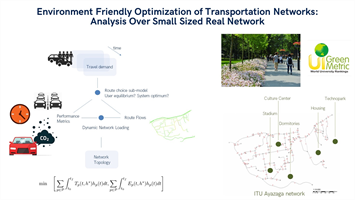Aim of the proposed study, supported through TUBITAK 1001 Programme with around USD110000 of budget, is modeling, analysis, and policy setting for improvement in the purpose of minimizing the environmental impacts of vehicles’ exhaust gas emissions over small sized real traffic network of a settlement in one of the central business districts of a metropolitan city using mainly the existing network traffic flows and the commuting prefrences in conjunction with the environmentally friend and/or energy-efficient objective functions in the optimization sought.
You can find the detailed explanation about the project, coordinated by Prof. Dr. Hilmi Berk Çelikoğlu, below.


Project Title: Environment Friendly Optimization of Transportation Networks: Analysis Over Small Sized Real Network
Project Type: TÜBİTAK 1001
Project Coordinator: Prof. Dr. Hilmi Berk Çelikoğlu
Abstract:
Aim of the proposed study, supported through TUBITAK 1001 Programme with around USD110000 of budget, is modeling, analysis, and policy setting for improvement in the purpose of minimizing the environmental impacts of vehicles’ exhaust gas emissions over small sized real traffic network of a settlement in one of the central business districts of a metropolitan city using mainly the existing network traffic flows and the commuting prefrences in conjunction with the environmentally friend and/or energy-efficient objective functions in the optimization sought. Since the context of the study proposed enables the impact analysis of the effects of both the sustainable and the efficient use of the natural resources and the production of environmentally friend and high katma değer products with clean technologies to prevent environmental degradations –as adopted from the agreements of the international bodies, and as well the strategies and the policies– on the environment and mobility; its contributions to the optimization in environmentally freind transportation network design in terms of approaches at decision making level and in terms of methods and employments at the modeling level are novel.
The subject will be formulated as an environment-friendly traffic assignment problem within the network design context. The solution approaches may vary as the solutions may be sought: considering either the entire assignment process or its demand and supply components in part; and/or considering the subject as a multi-objective bi-level optimization problem. Due to the inherent characteristics of the solution existing as the consideration of a real world network with relatively complex characteristics –when compared with existing test networks for benchmarking- and the need to the time-varying dynamic solution of the problem, a simulation-based method will be employed. In the cases that a number of scenarios will require, exact solutions to the specific problems will be sought as well. Accordingly, to obtain the simulation-based dynamic solution, a network traffic simulation software –that can be intervened via its API (application programing interface) in the purpose of redefining objective functions and/or constraints or that can be integrated to an existing emission model– will be utilized.
With the analyses conducted on the scenarios, approaches to minimization of vehicles’ exhaust gas emissions will be proposed that aims: directly the reduction of traffic-based gas emissions and the consequent air quality; and indirectly the external cost of road-based transportation’s impacts on environment. The modeling and solution framework to be proposed throughout the study is expected to be a sample for the optmization of relatively larger scale networks.